#Justification
Text
"Anyway, it'll be int'resting to see if it works."
"Yes, but it's wrong," said Granny.
"Not for these parts, it seems," said Nanny.
"Besides," said Magrat virtuously, "it can't be bad if we're doing it. We're the good ones."
"Oh yes, so we is," said Granny, "and there was me forgetting it for a minute there."
Terry Pratchett, Witches Abroad
#granny weatherwax#esme weatherwax#nanny ogg#magrat garlick#witches abroad#discworld#terry pratchett#witches#ethics#morals#context#local#negotiation#good and bad#justification#we're the good ones#forgetting
146 notes
·
View notes
Quote
Before Kant, an inquiry into "the nature and origin of knowledge" had been a search for privileged inner representations. With Kant, it became a search for the rules which the mind had set up for itself (the "Principles of the Pure Understanding"). This is one of the reasons why Kant was thought to have led us from nature to freedom. Instead of seeing ourselves as quasi-Newtonian machines, hoping to be compelled by the right inner entities and thus to function according to nature's design for us, Kant let us see ourselves as deciding (noumenally, and hence unconsciously) what nature was to be allowed to be like. Kant did not, however, free us from Locke's confusion between justification and causal explanation, the basic confusion contained in the idea of a "theory of knowledge."
Richard Rorty, Philosophy and the Mirror of Nature
#philosophy#quotes#Richard Rorty#Philosophy and the Mirror of Nature#Kant#belief#representation#justification#causality#knowledge#epistemology
80 notes
·
View notes
Text
Tout texte a
une justification et un sens car
personne n'écrit pour rien : que ce soit
pour être lu et partager, pour se libérer, se
sentir exister, parce qu'on ne parvient plus à
parler, qu'on se sent seul, enfermé, oui, tout
texte a une légitimité et doit, à ce titre,
être respecté…
V. H. SCORP
42 notes
·
View notes
Text
and after a while, you get tired of hearing them sell you their "sorry."
people say no human is perfect. but your question, your question, the one you are actually asking, is if humans are malicious and they fall silent.
you are begging. begging for a reasonable answer, one you can chew on.
you start wanting the whys more than you want the apologies,
because then you can decide if it was justified to hurt you.
you already know people will hurt you.
they protest that they have reasons. let's see if your reasons are good enough to make sense to me. at least give me reasons, I can do something with those. I can't build anything out of an apology.
no more sorrows, no more sorrows. give me redemption, give me analogies. give me a reason i can overlook what you have done.
CAN'T YOU HEAR?
i am looking at you, forward, with these tortured eyes.
please give me a excuse i can pretend to accept.
#poems and quotes#poems and poetry#poeticstories#poems#justification#answers#redemption#writeblr#poetblr#writers and poets
40 notes
·
View notes
Text
Prompt #1,217
"It's just human nature,"
#writing#writing prompt#writing prompts#prompt#prompts#story prompt#story prompts#dialogue#dialogue prompt#dialogue prompts#logic#logic prompt#logic prompts#justification#justification prompt#justification prompts#action#action prompt#action prompts#action/adventure#action/adventure prompt#action/adventure prompts#adventure#adventure prompt#adventure prompts
21 notes
·
View notes
Text

#philosophy#quotes#Bertrand Russell#The Art of Philosophizing#Russell#opinions#truth#justification#reason#rationality
39 notes
·
View notes
Text
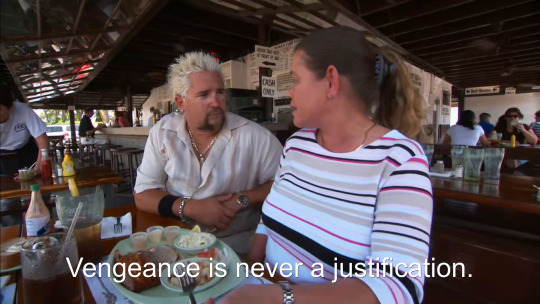
[Vengeance is never a justification.]
22 notes
·
View notes
Text
#life#lessons#life lesson#lesson#life lessons#lessons in life#lesson in life#reality#capitalism#capitalist society#joy#playful#play#quality time#enjoy life#existence#justification#justify my existence#childhood trauma#winnie the pooh#christopher robin#life goals#live life#work#all work no play#spend time with family#spend time with your kids#children#raising children#parenting
7 notes
·
View notes
Text
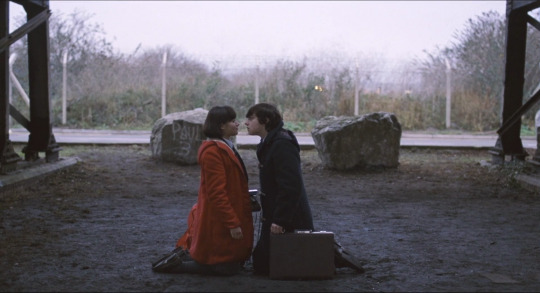
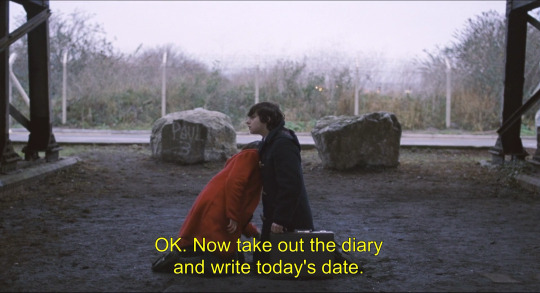
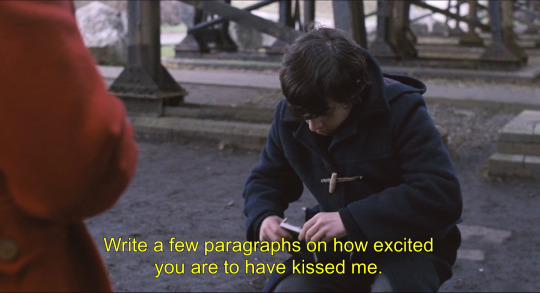


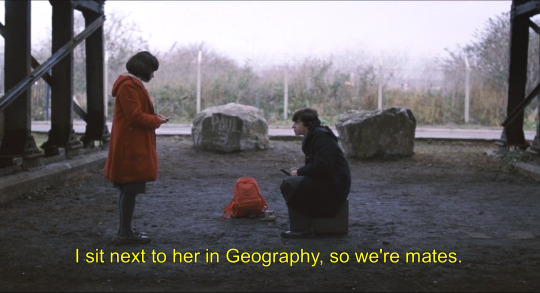

Submarine, 2010
#comedy#drama#romance#submarine#richard ayoade#joe dunthorne#craig roberts#yasmin paige#justification
21 notes
·
View notes
Text

Ordo Salutis: Justification
The Triumph of Faith
(John 14:27-31)
1 Therefore, having been justified by faith, we havea peace with God through our Lord Jesus Christ, 2 through whom also we have access by faith into this grace in which we stand; and we boast in the hope of the glory of God.
3 And not only so, but also we glory in our tribulations, knowing that tribulation produces perseverance; 4 and perseverance, character; and character, hope. 5 And hope does not make us ashamed, because the love of God has been poured out into our hearts through the Holy Spirit, the One having been given to us.
Christ's Sacrifice for the Ungodly
(Genesis 22:1-10; John 3:16-21)
6 Yet indeed Christ, of us still being without strength, according to the right time, died for the ungodly. 7 For rarely will anyone die for a righteous man, though on behalf of the good man perhaps someone would even dare to die. 8 But God demonstrates His love to us, that of us being still sinners, Christ died for us.
9 Therefore much more, having been justified now by His blood, we will be saved by Him from wrath! 10 For if, being enemies, we were reconciled to God through the death of His Son, much more, having been reconciled, shall we be saved in His life!
— Romans 5:1-10 | Berean Literal Bible (BLB)
The Berean Literal Bible © 2016 by Bible Hub and Berean Bible. All rights Reserved.
Cross References: Psalm 119:116; Isaiah 27:5; Daniel 9:24; Habakkuk 3:18; Matthew 5:12; Matthew 13:15; Luke 21:19; John 3:16; John 14:6; John 15:13; Acts 2:33; Acts 10:36; Romans 1:18; Romans 3:5; Romans 3:25; Romans 4:25; Romans 5:11; Romans 8:32; Philippians 2:22; Hebrews 6:19
#triumph of faith#peace#God#Lord#Jesus Christ#Christ's sacrifice for the ungodly#Romans 5:1-10#Book of Romans#BLB#Berean Literal Bible#Ordo salutis#justification#Bible Hub#Berean Bible#New Testament
7 notes
·
View notes
Text
… [I]t is quite strange that many people seem not even to dream that history could have been different, that progress could have taken different paths and we could have had—could still have—the benefits without the problems. It's an attitude brutally summed up by the binary adage, or rather, blackmail, that offers only "the nuclear age or the stone age" (with the result that we'll likely be stuck with both at once). Hence, at the end of his thoroughly researched history of the witch-hunts in Europe, which veils none of the horror, reconstructs the story as it unfolded and presents a rich and complex discussion of their cultural significance, Guy Bechtel comes to the surprising conclusion that, in essence, you can't make an omelette without breaking a few eggs. Indeed, he feels that this episode should be seen as a "revolution," and revolutions, Bechtel argues, "can only be achieved by the annihilation of opposing positions and of those who uphold them (or claim to uphold them)" He says, "The movement that tried to kill the witches is also, unwittingly of course, that which paved the way, later on, for the lives and thought of Montesquieu, Voltaire and Kant." In conclusion, he gives his blessing to a logic that he sums up with the maxim: "Killing the women of the past to create the men of the future." And, in doing so, Bechtel shows, once again, that historians of the witch-hunts are themselves products of the world that hunted the witches, and that they remain locked inside the frame of reference that the witch-hunts created. Bechtel's point of view is a stark contrast to the very different views of Barbara Ehrenreich and Deirdre English, who describe not only individual tragedies—the quashed aspirations and broken spirits of the hunts' victims—but also all that society denied itself by outlawing them, all that these women were prevented from developing and passing to future generations. Ehrenreich and English speak of "the sheer waste of talent and knowledge" represented by the witch-hunts, and urge us to undertake the "important task [. . . ] of recovering, or at least pointing out, what was lost."
Bechtel's determination to forcibly insert the horrendous history he has just pieced together into the virtuous account of the dawn of progress prompts him to come up with theories that are far-fetched to say the least: "It is likely that we are, at least partially, indebted to the unjustifiable massacre of the witches for a change in mindset toward greater rationalism, greater justice, stronger support for the right to legal defense and general awareness of human rights," as he puts it. An attempt to justify what you have, in the same sentence, just called unjustifiable? Matilda Joslyn Gage's analysis (as early as 1893) seems altogether more plausible:
“During the witchcraft period the minds of people were trained in a single direction. The chief lesson of the church that betrayal of friends was necessary to one's own salvation created an intense selfishness. All humanitarian feeling was lost in the effort to secure heaven at the expense of others, even those most closely bound by ties of nature and affection. Mercy, tenderness, compassion were all obliterated. Truthfulness escaped from the Christian world; fear, sorrow and cruelty reigned pre-eminent. [. . .] Contempt and hatred of women was inculcated with greater intensity; love of power and treachery were parts of the selfish lessons of the church. All reverence for length of years was lost. The sorrows and sufferings of a long life appealed to no sympathetic cord in the heart.”
A much more appropriate tableau to offer overexcited and gushy humanists requiring a cold shower.
-Mona Chollet, In Defense of Witches: The Legacy of the Witch Hunts and Why Women are Still on Trial
#mona chollet#witch hunts#male mind#justification#male entitlement#female oppression#anti christianity
16 notes
·
View notes
Text
One of my favorite things is to look at stories from a Christian perspective. I am a firm believer that all good stories, intentionally or unintentionally, reflect truth because of the Imago Dei and because God's truth is inescapably... true.
I was praying the other day about something heavy on my heart and realized that I not only needed to keep praying, but I also needed to act. Christianity is almost always two things that seem paradoxical. Waiting on God, trusting God isn't waiting on your hands. It's an active waiting and trusting.
And you know what a good visual is for that truth? A great little moment of faith made sight?
Stargate Atlantis.
Every time the Team is captured, which is quite often, they know their people are coming for them, but they also try to escape. Their knowledge and faith in their people never means they don't go to work to free themselves.
This is true every day for the believer. We trust and work. This is true in our fight against sin, doubt, and despair. Trust and work. This is Justification and Sanctification hand in hand.
Good stories let us practice being brave before we have to be.
Next time, I'm tempted by sin—every moment of every day—I can remember to trust the Spirit's sanctifying work while also fleeing. Staying in the fight, but never fighting alone, dying but never dying alone.

So, for just a moment, my faith was made sight, and I was gifted by the Lord with some fortification by a good story.
@mournerofcrows @dangerously-human
#stargate atlantis#the team#sga#stories let us practice being brave before we have to be#christianity#fortitude#never out of the fight#justification#sanctification#reformed baptist#Imago Dei
22 notes
·
View notes
Quote
[Epistemology] is supposed to explain how knowledge is possible, and to do that in some a priori way which both goes beyond common sense and yet avoids any need to mess about with neurons, or rats, or questionnaires. Given these somewhat exiguous requirements and no knowledge of the history of philosophy we might well be puzzled about just what was wanted and about where to begin. Such puzzlement can only be alleviated by getting the hang of terms like "Being versus Becoming," "sense versus intellect," "clear versus confused perceptions," "simple versus complex ideas," "ideas and impressions," "concepts and intuitions." We will thereby get into the epistemological language-game, and the professional form of life called "philosophy."
Richard Rorty, Philosophy and the Mirror of Nature
#philosophy#quotes#Richard Rorty#Philosophy and the Mirror of Nature#epistemology#knowledge#justification#language
104 notes
·
View notes
Text

3 notes
·
View notes
Photo
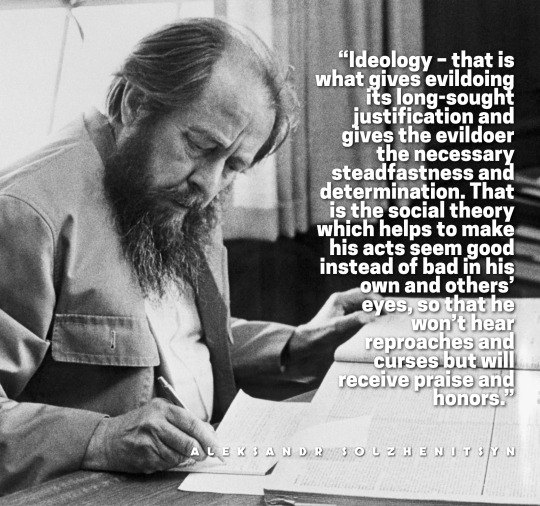
“Ideology – that is what gives evildoing its long-sought justification and gives the evildoer the necessary steadfastness and determination. That is the social theory which helps to make his acts seem good instead of bad in his own and others’ eyes, so that he won’t hear reproaches and curses but will receive praise and honors.”
-- Aleksandr Solzhenitsyn, “The Gulag Archipelago”
#Aleksandr Solzhenitsyn#The Gulag Archipelago#ideology#evil#social theory#justification#religion is a mental illness
37 notes
·
View notes
Text
My mother threatens me all the time. She holds money, home, food, and education all as a consequence of what she deems to be correct behaviour. And I see her face. She enjoys being in a position of power, having all the power, and I am always powerless. Nobody believes me. "Compartmentalize," they say, as if I can put all the hurt and pain into a perfect little box. "She's struggling and going through a hard time," they say, as if her pain justifies mine. "Stop being such a brat," they say, as I scream and scream and scream in a hundred different ways.
#heartache#spilled ink#spilled thoughts#mental health#mental illness#spilled words#tw abuse#emotional abuse#parental abuse#female abusers#toxic parents#childhood trauma#power#powerless#threats#don't understand#alone#compartmentalize#justification#bratty#box#pain#scream#scream into the void
3 notes
·
View notes